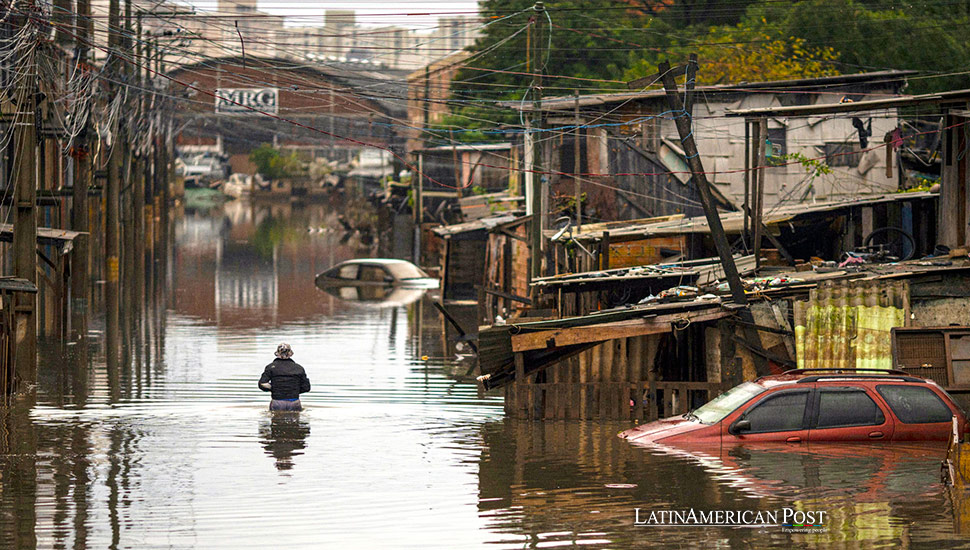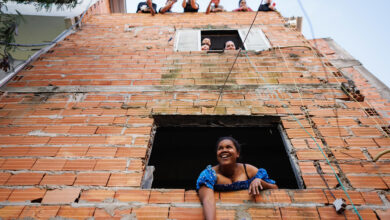Severe Flooding in Brazil Devastates Communities Again

Heavy rains have struck Brazil’s southernmost state once more, devastating days-long clean-up efforts and flooding previously untouched areas in Porto Alegre, Rio Grande do Sul’s capital, exacerbating the crisis that has already displaced hundreds of thousands.
Brazil’s southernmost state, Rio Grande do Sul, has been hit hard by relentless rains, causing severe flooding that has claimed 163 lives and displaced around 600,000 people over the past month. On Thursday, heavy rains returned, undoing days of clean-up efforts and flooding new areas in Porto Alegre, the state capital. This disaster has exacerbated the ongoing crisis and brought new challenges to a city struggling to recover.
The record flooding over the past month has left a trail of destruction across Rio Grande do Sul. Initially, the rains had lightened to a drizzle, allowing stores to reopen and residents to rebuild. However, the skies opened up again on Thursday morning, dumping heavy rains and flooding areas of Porto Alegre that had previously been spared.
In the neighborhood of Menino Deus, a daycare that had just reopened on Wednesday after a week-long clean-up was forced to evacuate as floodwaters rushed in. “It all happened very quickly, much faster than last time,” said the director of the childcare center, who wished to remain anonymous.
Data from the National Meteorological Institute revealed that parts of Porto Alegre received more rain in 12 hours than they typically do in an entire month. The fresh downpour flooded new areas in the city, such as the southern neighborhood of Cavalhada. Residents like Gimena Samuel had to call for emergency rescue for her elderly parents trapped by the rising waters. “There are many elderly people here who can’t get out alone,” she explained.
Historical Context of Flooding in Brazil
Brazil’s vast and varied geography has a long history of natural disasters, including floods. The country’s southern region, particularly Rio Grande do Sul, is prone to severe weather due to its proximity to the Atlantic Ocean and complex weather patterns. Historically, floods have caused significant damage, disrupting lives and the economy.
Climate change has intensified these weather patterns in recent years, leading to more frequent and severe flooding. The current situation in Rio Grande do Sul is a stark reminder of the growing impact of climate change on vulnerable regions. The government’s response to these disasters is crucial in mitigating their effects and aiding recovery efforts.
Government and Community Response
Porto Alegre’s Mayor, Sebastião Melo, acknowledged that while the city was not surprised by the downpour, its intensity was unexpected. “It was cumbersome,” he told reporters. Despite the city’s preparations, the sudden and severe rains overwhelmed the local infrastructure.
Residents, however, expressed frustration over the need for adequate warning and preparation. Earlier in the week, the city had asked residents to leave their trash on the sidewalks for collection. The new rains carried the garbage into the streets, clogging drains and worsening the flooding. This misstep highlighted the need for better disaster management and communication.
The Brazilian government and local authorities have been working to provide relief to affected communities. Emergency services have been deployed to rescue stranded individuals and distribute essential supplies. However, the scale of the disaster has stretched resources thin, and the community response has been critical in filling gaps.
Personal Stories of Resilience
The resilience of Porto Alegre’s residents has been remarkable amid the chaos. Stories of neighbors helping each other, volunteers aiding clean-up efforts, and community shelters providing refuge have been expected. These personal stories of solidarity and perseverance shine through the devastation.
One such story is that of Maria Silva, a resident of the northern part of the city, who has been volunteering at a local shelter. “We have to support each other. The government is doing what it can, but we need to step up as a community,” she said. Her efforts and many others have provided much-needed relief and hope to those affected.
The Role of Climate Change
The recurring floods in Porto Alegre underscore the broader issue of climate change. Scientists have long warned that rising global temperatures and changing weather patterns will lead to more extreme weather events. With its vast natural landscapes and diverse ecosystems, Brazil is particularly vulnerable to these changes.
Climate experts argue that the country needs to invest more in infrastructure that can withstand such events and in policies that mitigate the impact of climate change. This includes better urban planning, improved drainage systems, and reforestation efforts to absorb excess rainwater.
Future Preparedness and Mitigation
The recent floods in Porto Alegre highlight the urgent need for comprehensive disaster preparedness and mitigation strategies. This involves immediate response measures and long-term planning to reduce vulnerability and enhance resilience.
Investments in modern infrastructure that can handle extreme weather, improved forecasting and warning systems, and community education programs are essential. Moreover, there needs to be a stronger focus on sustainable development practices that address the root causes of climate change.
The severe flooding in Porto Alegre and the broader Rio Grande do Sul region is a stark reminder of the growing challenges of climate change and extreme weather events. The human toll and the widespread destruction underscore the urgent need for effective disaster management and climate adaptation strategies.
As Porto Alegre grapples with the aftermath of these floods, the resilience and solidarity of its residents provide a beacon of hope. However, more needs to be done at the governmental and community levels to prepare for and mitigate the impacts of such disasters.
Also read: Brazil and Central America at the Heart of Mercon’s Bankruptcy Saga
Brazil’s experience is not unique but part of a global pattern of increasing climate-related disasters. The lessons learned from Porto Alegre can serve as a guide for other regions facing similar challenges. Ensuring a sustainable and resilient future requires concerted efforts to address the immediate impacts of climate disasters and the long-term causes of climate change.
In the face of such adversity, the spirit of the people of Porto Alegre stands as a testament to human resilience and the power of community to overcome the most challenging circumstances.





